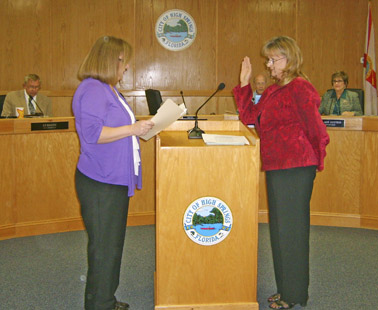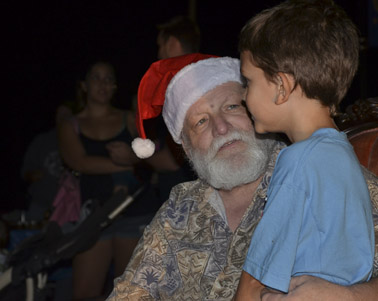 CARL MCKINNEY/Alachua County Today
CARL MCKINNEY/Alachua County Today
Evan Maroon, 5, eating a Thanksgiving lunch with his mother, Blair Poole. The students helped out with preparation of the holiday meal.
ALACHUA – Turkey soaked in gravy, creamy white mashed potatoes and homemade cranberry sauce made its presence in the classroom for parents and children at W.W. Irby Elementary School on Thursday, Nov. 21.
Thanksgiving came early to all of the kindergarteners sitting down to a traditional feast with their parents.
Having Thanksgiving dinner at W.W. Irby Elementary with the kindergarteners has become a tradition started by kindergarten teacher Kathryn Lehtola.
The meal wasn’t just any meal for the parents and students, but made with love from the students themselves, Lehtola said. Having spent half of the morning the day before, moving to different stations for each item for their meal, 5- and 6-year-old boys and girls worked to make the parent-child lunch possible.
“Your child has had their hands in, around and about everything you will eat,” Lehtola said.
However, before dinner, all of the kindergarten classes came together, dressed in Native American headbands and pilgrim costumes, to entertain the families with a couple of Thanksgiving-themed songs.
First the children started with the popular “Grinding the Maize,” then there was a song about Bert the Turkey and to conclude the morning’s music was a song about Thanksgiving, which was performed with laminated signs spelling the word “Thanksgiving,” all while Lehtola directed.
Valdenora Fortner, W.W. Irby Elementary principal, said that the tradition is one that promotes family time, which is important to parent-child bonding.
“The kids of course talk it up because they’ve been working on placemats, recipes and food,” Fortner said. “They’re very excited. They’ve even earned some of their feathers for their headbands.”
The preparation for the feast had some educational value, too.
Students learned measurements while cooking and listened to the history behind grinding maize, according to a letter that was sent out to parents announcing the annual Thanksgiving dinner.
While the children and parents sat and ate their homemade Thanksgiving meal, children dove into their mashed potatoes and turkey and parents chatted about the upcoming holidays.
Parents April and Alan Rice attended the Thanksgiving dinner with the school for their second year in a row. The parents looked forward to the dinner this year after experiencing it with their son for the first time last year and asked for the day off weeks in advance in order to attend.
“It’s a good idea because nowadays nobody cooks, so this is a good learning procedure for them at an early age,” said grandmother, Ella Voture.
The children’s experience with cooking and making the food proved was worth it, according to Jeremy Nipper, 5, who said that making the food that he was eating was a lot of fun.
# # #
Email eotero@
alachuatoday.com
Add a comment


